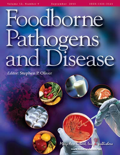
Foodborne Pathogens and Disease
Scope & Guideline
Pioneering insights into foodborne pathogens and prevention.
Introduction
Aims and Scopes
- Food Safety and Microbial Pathogens:
The journal emphasizes research on foodborne pathogens such as Salmonella, E. coli, and Listeria, exploring their prevalence, virulence, and resistance patterns in various food matrices. - Antimicrobial Resistance:
A significant focus is placed on studying antimicrobial resistance profiles among foodborne pathogens, including the mechanisms of resistance and implications for public health. - Epidemiological Studies:
The journal publishes epidemiological research that tracks outbreaks and assesses risk factors associated with foodborne illnesses, contributing to the understanding of transmission dynamics. - Innovative Detection Methods:
Research on novel detection methods, including molecular techniques, is highlighted, aiming to enhance the rapid identification of pathogens in food products. - Food Safety Interventions:
The journal includes studies on interventions and control measures to mitigate foodborne illnesses, focusing on practical applications in food industry settings. - Public Health Implications:
Articles also explore the broader public health implications of foodborne diseases, including economic burdens and healthcare impacts.
Trending and Emerging
- Whole Genome Sequencing (WGS) Applications:
There is a growing trend in utilizing whole genome sequencing for outbreak investigation and pathogen characterization, enhancing the ability to trace and control foodborne pathogens. - Antimicrobial Resistance Genes and Plasmids:
Research focusing on the identification and characterization of antimicrobial resistance genes, particularly those associated with plasmid transmission, is increasingly prominent. - Impact of Climate Change on Food Safety:
Emerging studies are beginning to explore how climate change affects foodborne pathogens, including changes in pathogen virulence and distribution. - Microbiome Studies in Food Safety:
There is a rising interest in studying the microbiome of food products and its effect on food safety, highlighting the complex interactions between foodborne pathogens and beneficial microorganisms. - Innovative Food Preservation Techniques:
Research on novel preservation methods, such as the use of natural antimicrobials and biopreservation strategies, is gaining traction as alternatives to traditional chemical preservatives. - Consumer Behavior and Food Safety:
An increasing number of studies are examining consumer behaviors and perceptions regarding food safety, particularly in the context of emerging pathogens and foodborne outbreaks.
Declining or Waning
- Traditional Culture-Based Methods:
There is a noticeable decline in studies utilizing traditional culture-based methods for pathogen detection, as the field shifts towards more rapid molecular and genomic approaches. - Single Pathogen Studies:
Research focusing on single pathogens has become less common, with a trend towards multi-pathogen studies that assess broader microbial communities in food safety contexts. - Historical Epidemiological Studies:
Research that solely investigates historical outbreaks without integrating modern genomic techniques or contemporary data analytics is becoming less frequent. - Foodborne Illness Surveillance Reports:
The publication of general surveillance reports on foodborne illnesses is waning as the journal increasingly prioritizes specific, actionable research findings.
Similar Journals

New Microbes and New Infections
Empowering healthcare through cutting-edge microbial research.New Microbes and New Infections is an esteemed peer-reviewed journal published by Elsevier Sci Ltd that has been a prominent platform for disseminating groundbreaking research in the fields of Infectious Diseases and Microbiology since its establishment in 2013. With an impressive Open Access model, this journal ensures that vital research findings are readily accessible to researchers, healthcare professionals, and academics worldwide. Positioned in the Q2 category for Infectious Diseases and Q3 for Microbiology in 2023, it reaches a significant global audience, as demonstrated by its high Scopus rankings—#44 out of 344 in Medicine: Infectious Diseases, and #34 out of 182 in Immunology and Microbiology. The journal aims to inspire new ideas and foster collaborations by publishing high-quality research focused on novel microbes and infections, thus playing a crucial role in advancing science and public health in an era where understanding infectious agents is more vital than ever.
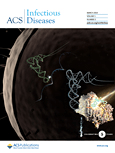
ACS Infectious Diseases
Cutting-edge Research for a Healthier TomorrowACS Infectious Diseases is a premier journal in the field of infectious diseases, published by the American Chemical Society. With an impressive Impact Factor that places it in the Q1 category for Infectious Diseases in 2023, the journal serves as an essential resource for researchers, healthcare professionals, and students dedicated to the study of infectious agents and their impact on public health. Established in 2015, the journal is committed to publishing cutting-edge research that enhances our understanding of infectious diseases and fosters the development of innovative interventions. Although not an open access journal, it provides a platform for high-quality research that influences policies and practices in the field. With an address located at 1155 16TH ST, NW, WASHINGTON, DC 20036, ACS Infectious Diseases is an authoritative voice in advancing the science and practice of infectious disease management.
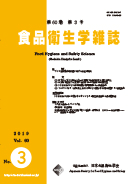
Food Hygiene and Safety Science
Cultivating a Safer Future through Food ScienceFood Hygiene and Safety Science is a pivotal academic journal published in Japan by the esteemed FOOD HYGIENE & SAFETY. With its ISSN 0015-6426, this journal operates within the broad domains of food science, public health, and medicine, strategically addressing the critical issues surrounding food hygiene and safety. With a notable history spanning from 1960 to 2024, it has become an essential resource in these fields, currently holding a Q3 category ranking in Food Science as well as in Medicine (Miscellaneous) and Public Health, Environmental and Occupational Health, according to the 2023 evaluations. Although access options may vary, the journal is committed to disseminating vital research findings to enhance food safety practices on a global scale. With its focus on advancing knowledge and sharing innovative practices, Food Hygiene and Safety Science serves as a vital platform for researchers, professionals, and students dedicated to improving food safety standards and public health outcomes.

ITALIAN JOURNAL OF FOOD SCIENCE
Connecting Researchers to the Heart of Food ScienceITALIAN JOURNAL OF FOOD SCIENCE is a distinguished open-access publication dedicated to advancing knowledge in the field of food science, catering to a global audience of researchers, professionals, and students. Published by Codon Publications in Singapore, this journal, operating under the ISSN 1120-1770 and E-ISSN 2239-5687, has been a vital platform for scholarly discourse since its inception in 1996, converging towards a comprehensive view of food science trends through 2024. With an impressive ranking in the third quartile (Q3) of the Food Science category and a Scopus rank of #151 out of 389, the journal plays a significant role in disseminating high-quality research, contributing to a richer understanding of food science within the agricultural and biological sciences. Since transitioning to open access in 2008, it has further expanded its reach, ensuring that innovative research is accessible to all, thereby fostering collaboration and knowledge exchange in this vital industry.
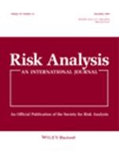
RISK ANALYSIS
Transforming Insights into Actionable Risk SolutionsRISK ANALYSIS is a premier journal published by Wiley, focusing on the critical intersection of safety, risk, reliability, and quality within the fields of engineering and physiology. With a strong standing reflected in its Q1 category ranking in Safety, Risk, Reliability and Quality and Q2 in Physiology (medical), this journal is a vital resource for researchers, professionals, and students eager to stay informed on the latest methodologies, theories, and applications surrounding risk assessment and management. Since its inception in 1981, RISK ANALYSIS has been instrumental in shaping the discourse in its fields, garnering a robust reputation verified by its high rankings on Scopus, where it is positioned in the 85th percentile in Safety and the 77th percentile in Medicine. Though it does not currently offer Open Access options, the journal remains essential for those committed to advancing their understanding of risks associated with complex systems. For more insights, RISK ANALYSIS is available to readers throughout its converged years extending to 2024, solidifying its role as a foundational journal for impactful research.
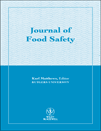
JOURNAL OF FOOD SAFETY
Uncovering vital knowledge in food microbiology.Journal of Food Safety is a premier resource in the field of food science, offering invaluable insights into food safety practices, microbiology, and parasitology. Published by WILEY, this journal has been a pivotal platform for the dissemination of research since its inception. With an impressive impact factor reflecting its esteemed reputation, the journal caters to a diverse audience of researchers, professionals, and students committed to advancing knowledge in food safety. While currently not an open access journal, it still provides essential findings that contribute significantly to the understanding of foodborne pathogens and preventive measures. Recognized in the Q2 and Q3 quartiles across various relevant disciplines, including Food Science, Microbiology, and Parasitology, the Journal of Food Safety continues to uphold high standards in scientific research and education. Researchers are encouraged to submit their manuscripts and engage with groundbreaking studies that are shaping the future of food safety.

Applied Food Research
Elevating Food Science Through Pioneering ResearchApplied Food Research, published by Elsevier, is an esteemed journal that plays a critical role in advancing the field of Food Science. With an ISSN of 2772-5022, the journal has established itself as a premier outlet for high-quality research, achieving a commendable Q1 ranking in the 2023 Food Science category and a 63rd percentile in Scopus rankings for Agricultural and Biological Sciences. Covering a diverse range of topics from food safety to innovative processing techniques, Applied Food Research seeks to publish pioneering studies that enhance our understanding of food systems and contribute to broader discussions on sustainability and nutrition. As it converges on its fourth year of publication, researchers, professionals, and students alike are encouraged to engage with its content through various open access options, ensuring widespread dissemination of knowledge in a field that is vital to global health and well-being. Operating out of Amsterdam, Netherlands, this journal is poised to be an indispensable resource for anyone dedicated to making significant contributions in the domain of food science.
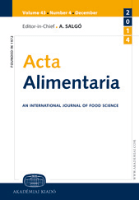
ACTA ALIMENTARIA
Connecting research and practice in food technology.ACTA ALIMENTARIA is a renowned journal in the field of food science, published by AKADEMIAI KIADO ZRT, based in Hungary. Since its inception in 1973, it has served as a vital platform for disseminating high-quality research on food chemistry, microbiology, nutrition, and technology, contributing significantly to the advancement of knowledge in the agricultural and biological sciences. Currently classified in the Q3 quartile of the 2023 Food Science category, the journal is positioned to address pressing issues pertaining to food safety, quality, and sustainability, making it an invaluable resource for researchers, professionals, and students alike. Although it does not currently offer open access, the journal maintains a strong reputation with a readership keenly interested in the latest developments in food science. With a Scopus rank placing it in the 38th percentile of its category, ACTA ALIMENTARIA continues to be a pivotal reference for those engaged in food research and innovation.

Microbiology Research
Fostering Collaboration in Microbial InnovationMicrobiology Research, published by MDPI, stands as a pivotal open-access journal in the field of microbiology, having established its presence since 2010. Based in Switzerland, this journal strives to provide a platform for innovative research and cutting-edge findings in various branches of microbiology, including medical microbiology and molecular biology. With an impact factor that reflects its dedication to scholarly excellence, Microbiology Research is classified in the Q3 category for both microbiology and medical microbiology, and Q4 for molecular biology as of 2023, indicating its growing importance and outreach within these domains. The journal aims to foster discussion and collaboration among researchers, professionals, and students by presenting articles that cover a wide array of topics and methodologies in microbiological research. Leveraging its open-access model, Microbiology Research ensures that high-quality research is accessible to a global audience, thus facilitating the advancement of knowledge and innovation in the microbial sciences.

Reviews and Research in Medical Microbiology
Your Essential Resource for Medical Microbiology AdvancementsReviews and Research in Medical Microbiology is a premier academic journal published by LIPPINCOTT WILLIAMS & WILKINS, focusing on groundbreaking research and comprehensive reviews that advance the understanding of medical microbiology. With an ISSN of 2770-3150 and an E-ISSN of 2770-3169, this journal serves as an essential resource for researchers, healthcare professionals, and students dedicated to the study of pathogens, infectious diseases, and microbial mechanisms affecting health. While the journal currently does not offer open access, its rigorous peer-review process ensures that only high-quality, impactful research is disseminated to the scientific community. The journal aims to bridge gaps in knowledge by presenting cutting-edge studies that explore novel therapeutic strategies, diagnostic methods, and the evolving landscape of microbial resistance. Nestled in the heart of Philadelphia, this journal proudly contributes to the advancement of medical microbiology and is an indispensable platform for the publication of critical findings that shape clinical practices and research trajectories in the field.